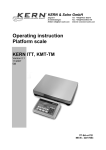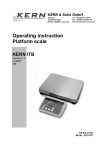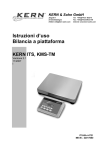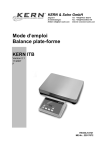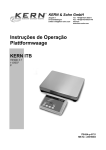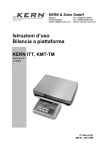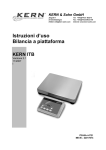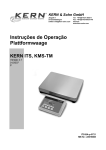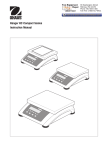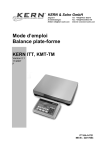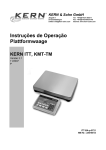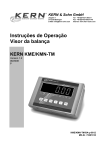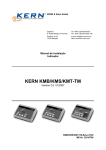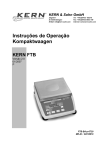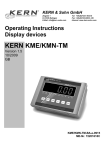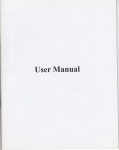Download Operating Instruction: Platform Scale, KERN ITS, KMS-TM
Transcript
KERN & Sohn GmbH Ziegelei 1 D-72336 Balingen E-Mail: [email protected] Tel: +49-[0]7433- 9933-0 Fax: +49-[0]7433-9933-149 Internet: www.kern-sohn.com Operating instruction Platform scale KERN ITS, KMS-TM Version 2.1 11/2007 GB ITS-BA-e-0721 ME-Nr.: 22017077 ITS-BA-e-0720 Table of contents Table of contents Page 1 1.1 1.2 1.3 Introduction .....................................................................................5 Safety instructions .............................................................................5 Description ......................................................................................6 Putting into operation ........................................................................9 2 2.1 2.2 2.3 2.4 2.5 2.6 2.7 2.8 2.9 2.10 2.11 Operation ......................................................................................12 Switching on and off .......................................................................12 Zeroing / Zero point correction ..........................................................12 Simple weighing .............................................................................12 Weighing with tare ..........................................................................13 Calling up the gross weight and tare value .........................................14 Displaying weight values with a higher resolution ...............................14 Displaying the capacity available ......................................................14 Dynamic weighing ..........................................................................14 Printing results ...............................................................................15 Switching scales .............................................................................15 Cleaning ........................................................................................16 3 3.1 3.2 3.3 3.4 3.5 3.6 3.7 Counting .......................................................................................17 Counting parts into a container .........................................................17 Counting parts out of a container ......................................................18 Counting with variable reference quantity ...........................................18 Counting with minimum accuracy ....................................................18 Reference optimization ....................................................................19 Counting with automatic reference determination ................................19 Counting with two scales .................................................................20 4 4.1 4.2 4.3 4.4 4.5 4.6 4.7 Settings in the menu ......................................................................22 Operating the menu ........................................................................22 Overview .......................................................................................24 Scale settings (SCALE) ....................................................................27 Application settings (APPLICATION) ..................................................30 Terminal settings (TERMINAL) ..........................................................32 Configuring interfaces (COMMUNICATION) .........................................33 Diagnosis and printing out of the menu settings (DIAGNOS) ................36 5 5.1 5.2 Interface description ......................................................................37 SICS interface commands ................................................................37 TOLEDO Continuous mode ..............................................................40 6 Event and error messages ..............................................................42 7 7.1 Technical data and accessories ......................................................44 Technical data ................................................................................44 User manual ME-Nr.:22017077 01/07 3 ITS-BA-e-0720 Table of contents 8 8.1 8.2 4 Appendix ......................................................................................47 Table of Geo Values ........................................................................47 Sample protocols ...........................................................................50 User manual ME-Nr.:22017077 01/07 ITS-BA-e-0720 1 Introduction Introduction 1.1 Safety instructions CAUTION! Do not use the scales in hazardous areas! Our product range includes special devices for hazardous areas. DANGER! Electric shock hazard! ▲ Always pull out the mains plug before any work on the device. DANGER! Electric shock hazard if the mains cable is damaged! ▲ Check the mains cable for damage regularly and replace it immediately if it is damaged. ▲ On the rear side of the device, maintain a clearance of at least 3 cm in order to prevent the mains cable bending too much. CAUTION! On no account open the device! The warranty is void if this stipulation is ignored. The device may only be opened by authorized persons. Disposal ➜ Observe the valid environmental regulations when disposing of the scale. If the device has a rechargeable battery: The battery contains heavy metals and therefore must not be disposed of with normal waste. ➜ Observe the local regulations for disposing of environmentally hazardous materials. User manual ME-Nr.:22017077 01/07 5 ITS-BA-e-0720 Introduction Note Use with foodstuffs Parts coming into contact with foodstuffs have smooth surfaces and are easy to clean. The materials used do not splinter and are free of harmful substances. With foodstuffs, it is recommended to use the supplied protective cover. ➜ Clean the protective cover regularly and carefully. ➜ Replace damaged or very dirty protective cover immediately. 1.2 1.2.1 1 Display 2 Specifications, rating plate 3 Keys 1 Power supply connection 2 Weighing platform connection 3 Optional interface 4 RS232 interface 6 Description Overview 1 2 3 4 User manual ME-Nr.:22017077 01/07 ITS-BA-e-0720 Introduction 1.2.2 Display 1 2 3 4 Com 14 13 12 % OK 0 50 50 123 5 123 kg % Pcs Auto Opt 100100 11 6 7 8 10 9 1 7-segment display, 7 digits, with decimal point 2 Active interface 3 Symbol for displaying gross and net values 4 Active scale 5 Weighing range display 6 Battery charge level; only present on scales with a battery 7 Weight units 8 Selected reference quantity 9 Symbols for optimizing the average piece weight 10 Symbol for dynamic weighing 11 Graphic display of the weighing range 12 Stability monitor (goes out when a stable weight value is reached) 13 Sign 14 Identification for changed or calculated weight values, e.g. higher resolution, minimum weight not reached User manual ME-Nr.:22017077 01/07 7 ITS-BA-e-0720 Introduction 1.2.3 Keypad Main functions Key Function in operating mode Function in the menu Switching device on / off, abort To the last menu item –End- Setting scale to zero Scrolling back Taring scale Scrolling forward Transfer key Activating menu item Long key press: Calling up menu Accepting selected setting Additional functions Key Function Switching between gross and net weight; displaying tare specification Calling up additional information, e.g. gross weight, average piece weight, higher resolution ... Switching the scale Switching between weight value and number of pieces Determining average piece weight from 10 pieces Determining average piece weight from any number of pieces 8 User manual ME-Nr.:22017077 01/07 ITS-BA-e-0720 Introduction 1.3 Putting into operation For startup, connect the terminal to an analog METTLER TOLEDO weighing platform (see installation instructions METTLER TOLEDO Terminals IND4.. or call METTLER TOLEDO Service). 1.3.1 Connecting the power supply CAUTION! Before connecting the scale to the mains, check whether the voltage value printed on the rating plate corresponds with the local mains voltage. ▲ Never connect the device if the voltage value printed on the rating plate is different to the local mains voltage. ➜ Plug the mains plug into the socket. After connection, the device performs a self-test. When the zero display appears, the device is ready to weigh. ➜ Calibrate the device in order to obtain the greatest possible precision, see Section 4.3.2. Terminals with AccuPac can work independently from the mains for approximately 30 hours in normal operation. A prerequisite for this is that the background lighting is switched off and that no peripheral devices are connected. The battery symbol indicates the present charging level of the battery. 1 segment corresponds to approx. 25 % capacity. When the symbol flashes the battery must be charged (min. 4 hours). The charging period is extended if work is continued during charging. The battery is protected against overcharging. Note The battery’s charging capacity can be reduced under continuous mains operation. ➜ To maintain the charging capacity, after a maximum of 4 weeks discharge the battery completely before recharging it. 1.3.2 Monitoring the test substances The metrology features of the balance and any possible available adjusting weight must be checked at regular intervals within the scope of quality assurance. For this purpose, the answerable user must define a suitable interval as well as the nature and scope of this check. Information is available on KERN’s home page (www.kernsohn.com) with regard to the monitoring of balance test substances and the test weights required for this. Test weights and balances can be adjusted quickly and at a reasonable price in KERN’s accredited DKD calibration laboratory (return to national normal). User manual ME-Nr.:22017077 01/07 9 ITS-BA-e-0720 Introduction 1.3.3 Adjustment General: According to the EU guideline 90/384/EEC balances must be verified officially if they are to be used as follows (legally regulated area): • For commercial transactions if the price of goods is determined by weighing • For the production of medines in pharmacies as well as for analyses in the medical and pharmaceutical laboratory • For official purposes • For the production of finished packages In case of doubt, please contact your local office of weights and measures. Verification Information: An EU qualification approval is available for those balances marked as appropriate for verification in the technical data. In the event that the balance is applied in an area subject to verification as described above, it must be officially verified and re-verified at regular intervals. Re-verification of a balance is carried out in compliance with the respective legal provisions of the states. The term of verification validity for balances in Germany, for example, is normally 2 years. The legal provisions of the country of use are to be observed. 10 User manual ME-Nr.:22017077 01/07 ITS-BA-e-0720 User manual ME-Nr.:22017077 01/07 Introduction 11 ITS-BA-e-0720 2 Operation Operation 2.1 Switching on Switching on and off ➜ Press . The scale conducts a display test. When the weight display appears, the scale is ready to weigh. Switching off ➜ Press . Before the display goes out, -OFF- appears briefly. 2.2 Zeroing / Zero point correction Zeroing corrects the influence of slight changes on the load plate. Manual 1. Unload scale. 2. Press . The zero display appears. Automatic In the case of scales that cannot be certified, the automatic zero point correction can be deactivated in the menu or the amount can be changed. As standard, the zero point of the scale is automatically corrected when the scale is unloaded. 2.3 Simple weighing 1. Place weighing sample on scale. 2. Wait until the stability monitor goes out. 3. Read weighing result. User manual ME-Nr.:22017077 01/07 12 ITS-BA-e-0720 Operation 2.4 2.4.1 Weighing with tare Taring ➜ Place the empty container on the scale and press . The zero display and the symbol NET appear. The tare weight remains saved until it is cleared. 2.4.2 Clearing the tare ➜ Unload scale and press . The symbol NET goes out, the zero display appears. If A.CL-tr is activated in the menu, the tare weight is automatically cleared as soon as the scale is unloaded. 2.4.3 Automatic taring Prerequisite A-tArE is activated in the menu, the symbol T flashes in the display. ➜ Place the container or packaging material on the scale. The packaging weight is automatically saved as the tare weight, the zero display and the symbol NET appear. 2.4.4 Chain tare Prerequisite The tare function CHAIn.tr is activated in the menu. With this function it is possible to tare several times if, for example, cardboard is placed between individual layers in a container. 1. Place the first container or packaging material on the scale and press . The packaging weight is automatically saved as the tare weight, the zero display and the symbol NET appear. 2. Weigh the weighing sample and read/print out the result. 3. Place the second container or packaging material on the scale and press again. The total weight on the scale is saved as the new tare weight. The zero display appears. 4. Weigh the weighing sample in the second container and read/print the result. 5. Repeat the last two steps for other containers. 13 User manual ME-Nr.:22017077 01/07 ITS-BA-e-0720 Operation 2.5 Calling up the gross weight and tare value 1. Press . The gross weight is displayed for 2 seconds. 2. Press again while the gross weight is displayed. The tare value is displayed. After a few seconds, the scale changes back to the net weight display. 2.6 Displaying weight values with a higher resolution ➜ Press . The current weight value is displayed for 2 seconds in a higher resolution. The scale then changes back to the normal resolution. 2.7 Displaying the capacity available The scale has a graphic display of the scale capacity available. The bar indicates how many per cent of the scale capacity is already occupied and what capacity is still available. In the example, approx. 65 % of the scale capacity is occupied. 2.8 Dynamic weighing With the dynamic weighing function, it is possible to weigh restless weighing samples such as live animals. If this function is activated, the symbol appears in the display. With dynamic weighing, the scale calculates the mean value from 56 weighing operations within 4 seconds. With manual start Prerequisite AVErAGE -> MAnuAL is selected in the menu. The weighing sample must be heavier than 5 scale divisions. 1. Place the weighing sample on the scale and wait until it has stabilized. 2. Press to start dynamic weighing. During dynamic weighing, horizontal segments appear in the display, and the dynamic result is then displayed with the symbol *. 3. Unload the scale to be able to start a new dynamic weighing operation. User manual ME-Nr.:22017077 01/07 14 ITS-BA-e-0720 Operation With automatic start Prerequisite AVErAGE -> AUtO is selected in the menu. The weighing sample must be heavier than 5 scale divisions. 1. Place the weighing sample on the scale. The scale starts the dynamic weighing automatically. During dynamic weighing, horizontal segments appear in the display, and the dynamic result is then displayed with the symbol *. 2. Unload the scale to be able to perform a new dynamic weighing operation. 2.9 Printing results If a printer or computer is connected to the scale, the weighing results can be printed out or sent to a computer. ➜ Press . The display contents are printed out and transferred to the computer. See Section 8.2 for sample protocols. 2.10 Switching scales If a second scale or a weighing platform is connected, e. g. via the optional analog second scale interface, the currently active scale is shown in the display. The second scale can be operated in exactly the same way as the first scale. ➜ Press . The display changes from one scale to the other. 15 User manual ME-Nr.:22017077 01/07 ITS-BA-e-0720 Operation 2.11 Cleaning CAUTION! Electric shock hazard! ▲ Before cleaning with a damp cloth, pull out the mains plug to disconnect the unit from the power supply. Other cleaning information: • Use damp cloths. • Do not use any acids, alkalis or strong solvents. • Do not clean using a high-pressure cleaning unit or under running water. • Follow all the relevant instructions regarding cleaning intervals and permissible cleaning agents. User manual ME-Nr.:22017077 01/07 16 ITS-BA-e-0720 Counting 3 Counting The terminal has additional functions for piece counting. The relevant settings in the menu are described in Section 4.4.1. 3.1 Counting parts into a container 1. Place the empty container on the scale and press . The container is tared and the zero display appears. 2. Place 10 reference parts on the scale and press . -or➜ Place the number of pieces displayed above the key . on the scale and press The scale determines the average piece weight and then shows the number of pieces. 3. Add more parts to the container until the required number of pieces is reached. Note • The average piece weight remains saved in the factory setting until a new average piece weight is determined. • With it is possible to switch between the number of pieces and the weighing units preset. • When the number of pieces is displayed, it is possible to display with the average piece weight, i. e. the weight of a single reference part, for 2 seconds. • If A.CL-APW ON is set in the menu, the average piece weight is automatically cleared after each counting operation. The average piece weight must be determined again for the next counting operation. • If ACCurCY ON is set in the menu, the accuracy achieved is briefly shown after the number of pieces is determined. 17 User manual ME-Nr.:22017077 01/07 ITS-BA-e-0720 Counting 3.2 Counting parts out of a container 1. Place the full container on the scale and press . The container is tared and the zero display appears. 2. Remove 10 reference parts and press . -or➜ Remove the number of pieces displayed above the key and press . The scale determines the average piece weight and then shows the number of pieces removed, together with a minus sign. 3. Remove more parts from the container until the required number of pieces is reached. 3.3 Counting with variable reference quantity If VAr-SPL ON is set in the menu, it is possible to select from 5 preset reference quantities via . ➜ Press as often as necessary until the display above the key has changed to the desired reference quantity. The rest of the counting process is as described earlier. 3.4 Counting with minimum accuracy The item Min.rEFW in the menu allows to preset a minimum accuracy of 97.5 %, 99.0 % or 99.5 %. On the basis of this, the scale calculates the minimum reference weight necessary to reach the defined accuracy. 1. Place the reference parts on the scale and press or . 2. If the average piece weight is not sufficient to ensure the desired accuracy, Add x PCS appears. 3. Add the displayed number of pieces. The scale then automatically determines the average piece weight with the larger reference quantity. The rest of the counting process is as described earlier. User manual ME-Nr.:22017077 01/07 18 ITS-BA-e-0720 Counting 3.5 Reference optimization The greater the reference quantity, the more accurately the scale determines the number of pieces. 3.5.1 Automatic reference optimization rEF.OPt -> AUtO must be set in the menu for this. The symbol Auto Opt appears in the display. 1. Place the reference parts on the scale and press or . 2. Place additional reference parts, max. the same number as for the first reference determination, on the scale. The scale automatically optimises the average piece weight with the larger number of reference parts. The rest of the counting process is as described earlier. Note The reference optimization can be performed several times. 3.6 Counting with automatic reference determination Prerequisite A-SMPL ON is set in the menu. ➜ Place the number of pieces displayed above the key into the container. The scale automatically determines the average piece weight and then shows the quantity. The rest of the counting process is as described earlier. 19 User manual ME-Nr.:22017077 01/07 ITS-BA-e-0720 Counting 3.7 Counting with two scales For piece counting, it is possible to connect a second scale or weighing platform, e. g. a floor scale for counting a large number of pieces via the optional analog second scale interface. The necessary settings for the application and interface parameters are described in the Sections 4.4.1, 4.6.1 and 4.6.4. 3.7.1 Counting with a reference scale Prerequisite The connected second scale is configured as reference scale. 1. Place the reference parts on the reference scale and press or . The scale determines the average piece weight and changes to the display in pieces (PCS). 2. Place the parts to be counted on the first scale. The total quantity is displayed. Note • If tOtAL-Ct -> bULK is set in the menu, only the number of pieces on the bulk scale is displayed. • If tOtAL-Ct -> bOtH is set in the menu, the reference quantity is added to the bulk quantity. 3.7.2 Counting with a bulk scale Prerequisite The connected second scale is configured as bulk scale. 1. Place the reference parts on the first scale and press or . The scale determines the average piece weight and changes to the display in pieces (PCS). 2. Place the parts to be counted on the bulk scale. The total quantity is displayed. Note • If tOtAL-Ct -> bULK is set in the menu, only the number of pieces on the bulk scale is displayed on the bulk scale. • If tOtAL-Ct -> bOtH is set in the menu, the reference quantity is added to the bulk quantity. User manual ME-Nr.:22017077 01/07 20 ITS-BA-e-0720 Counting 3.7.3 Note Counting with an auxiliary scale This configuration allows counting of diverse parts, for example very small parts on one scale and large parts on the other scale. Prerequisite The connected second scale is configured as an auxiliary scale. The scale doesn’t change automatically but only after pressing the key. 1. Activate the appropriate scale. 2. Place the reference parts on this scale and press or . The scale determines the average piece weight and changes to the display in pieces (PCS). 3. Place the parts to be counted on the same scale. The number of pieces is displayed. 21 User manual ME-Nr.:22017077 01/07 ITS-BA-e-0720 4 Settings in the menu Settings in the menu Settings can be changed and functions can be activated in the menu. This enables adaptation to individual weighing requirements. The menu consists of 6 main blocks containing various submenus on several levels. 4.1 4.1.1 Operating the menu Calling up the menu and entering the password The menu differentiates between 2 operating levels: Operator and Supervisor. The Supervisor level can be protected by a password. When the device is delivered, both levels are accessible without a password. Operator menu 1. Press and keep it pressed until COdE appears. 2. Press again. The menu item tErMINL appears. Only the submenu dEVICE is accessible. Supervisor menu 1. Press and keep it pressed until COdE appears. 2. Enter the password and confirm with . The first menu item SCALE appears. Note No supervisor password has been defined when the device is first delivered. Therefore respond to the password inquiry with when you call up the menu for the first time. If a password has still not been entered after a few seconds, the scale returns to weighing mode. Emergency password for Supervisor access to the menu If a password has been issued for Supervisor access to the menu and you have forgotten it, you can still enter the menu: ➜ Press User manual ME-Nr.:22017077 01/07 3 times and confirm with . 22 ITS-BA-e-0720 Settings in the menu 4.1.2 Selecting and setting parameters COdE CAL dISPLAY tErMINL APPLIC SCALE tArE ... dEVICE SLEEP Scrolling on one level ACCESS COMMUNI PWr.OFF b.LIGHt ➜ Scroll forward: Press ➜ Scroll back: Press Activating menu items/ accepting selection ➜ Press . Exiting menu 1. Press . COM 1 rESEt MOdE dIAGNOS COM 2 End ... PriNtEr PArAMEt rSt.COMX . . The last menu item END appears. 2. Press . The inquiry SAVE appears. 3. Confirm inquiry with to save the settings and return to weighing mode. -or➜ Press 23 to discard changes and return to weighing mode. User manual ME-Nr.:22017077 01/07 ITS-BA-e-0720 Settings in the menu 4.2 Overview Level 1 Level 2 SCALE SCALE1/SCALE2 27 CAL 27 dISPLAY Level 3 Level 4 Level 5 UNIt1 g, kg, oz, lb, t UNIt2 g, kg, oz, lb, t Level 6 Page 29 rESOLU UNt.rOLL ON, OFF A-tArE ON, OFF ChAIn.tr ON, OFF A.CL-tr ON, OFF ZErO AZM OFF; 0.5 d; 1 d; 2 d; 5 d; 10 d rEStArt ON/OFF FILtEr VibrAt LOW, MEd, HIGH, PrOCESS UNIVEr, dOSING StABILI FASt, StAndrd, PrECISE tArE APPLIC tERMINL 29 29 29 30 30 rESEt SUrE? COUNt VAr-SPL ON, OFF SPL-qtY Sq1 ... Sq5 Min.reFW OFF, 97.5%, 99.0%, 99.5% rEF OPt OFF, AUtO A-SMPL ON, OFF A.CL-APW ON, OFF ACCurCY ON, OFF tOtAL.Ct bULK, bOth 30 AVErAGE OFF, AUtO, MAnuAL 31 rESEt SUrE? 31 dEVICE SLEEP OFF, 1 min, 3 min, 5 min PWr OFF YES, NO b.LIGHt ON, OFF 32 ACCESS SUPErVI 32 rESEt SUrE? 32 User manual ME-Nr.:22017077 01/07 24 ITS-BA-e-0720 Settings in the menu Level 1 Level 2 Level 3 COMMUNI COM 1/COM 2 MOdE Level 4 Level 5 Level 6 Page 33 Print A.Print CONtINU dIALOG CONt.OLd dIAL.OLd dt-b dt-G GrOSS ON, OFF tArE ON, OFF nEt ON, OFF GrOSS ON, OFF tArE ON, OFF nEt ON, OFF COnt-Wt COnt-Ct 2nd.dISP rEF bULK AuXILIA PriNtEr PArAMEt rSt.COMx 25 tEmPLat StdArd, tEMPLt1, tEMPLt2 ASCi.Fmt LINE.FMt MULtI GLE LENGtH 1 ... 100 SEPArAt , ;... Add LF 0 ... 9 33 SIN- bAUd 300 ... 38400 PAritY 7 nonE, 8 nonE, 7 odd, 8 odd, 7 EVEN, 8 EVEN H.SHAKE NO, XONXOFF, nEt 422, nEt 485 NEt.Addr 0 ... 31 ChECSuM ON, OFF Vcc ON, OFF SUrE? 34 34 User manual ME-Nr.:22017077 01/07 ITS-BA-e-0720 Settings in the menu Level 1 Level 2 Level 3 Level 4 COMMUNI OPtION EtH.NEt IP.AddrS, SUbNEt, GAtEWAY 34 USb USb tESt 34 diGitAL IN 1 ... 4 OFF, ZErO, tArE, Print, 34 rEF 10, rEF n, SCALE, Unit OUT 1 ... 4 OFF, StAbLE, bEL.Min, AbV.Min, UndErLd, OVErLd, StAr ANALOG Mode rEF, bULK, AuXILIA, bYPASS 34 dEF.PrN tEMPLt1/ tEMPLt2 LINE 1 ... LINE 20 NOt.USEd, HEAdEr, SCALE.NO, GrOSS, tArE, nEt, APW, rEF Ct, PCS, StArLN, CrLF, F FEEd 35 tESt SC ExtErN dIAGNOS Level 5 Level 6 Page 36 KboArd dISPLAY SNr SNr2 LiSt LiSt2 rESEt.AL User manual ME-Nr.:22017077 01/07 SUrE? 26 ITS-BA-e-0720 Settings in the menu 4.3 4.3.1 Scale settings (SCALE) SCALE1/SCALE2 – Selecting scale This menu item only appears if an analog second scale or a weighing platform is connected. 4.3.2 CAL – calibration (adjustment) As the acceleration value due to gravity is not the same at every location on earth, each balance must be coordinated – in compliance with the underlying physical weighing principle - to the existing acceleration due to gravity at its place of location ( only if the balance has not already been adjusted to the location in the factory). This adjustment process must be carried out during the initial start-up, after change in location and variation of surrounding temperature. It is also recommendable to adjust the balance periodically during weighing operation in order to obtain exact measured values. This menu item is not available for certified scales without internal calibration weight. Adjusting of non verifiable balances CAL 1. Unload scale. 2. Activate menu item CAL with . The scale determines the zero point. –0- appears in the display. The calibration weight to be placed on the scale then flashes in the display. 3. If necessary, change the weight value displayed with 4. Place the calibration weight on the scale and confirm with . . The scale calibrates with the calibration weight loaded. After calibration is completed, -donE- appears briefly in the display, and the scale automatically returns to weighing mode. Adjusting of verifiable balances • Switch off the scale. • Remove the scale bottom plate by undoing the Torx TX20 retaining screws .Impor- tant: In order to remove the bottom plate it is necessary to break the certification seal affixed to it! Once this seal has been destroyed, the scale must be recertified by an accredited organization, and a new certification seal must be affixed before the instrument may be used as a certified scale again! • Hold down the service switch (pushbutton) on the analogprint (indicated by an arrow in the drawings below, while at the same time switching on the scale. Keep the service switch pressed in until "Scale" appears in the display . 27 User manual ME-Nr.:22017077 01/07 ITS-BA-e-0720 Settings in the menu Small platform model 1.Display "Scale":Press the 2.Display "Metrolo":Press the 3.Display "Scale1":Press the 4.Display "ramp":Press the 5.Display "SNR":Press the 6.Display "SCAL.bld":Press the Large platform model -key (within 20sec) -key -key -key -key -key 7.Display "GEO" (adjustment by means of GEO value): The GEO value can be set in this block and the balance also adapted to the local gravity ratios without adjusting weights. Case a)You are familiar with the GEO values. Once the -key has been pressed, the current GEO value will be displayed. Press the or -key, in order to alter the GEO value. . The next value is displayed every time the key is pressed (adjustment range: 0 - 31). See the GEO value chart in chapter 7.1.1 for the appropriate value. Confirm the selected GEO value using the -key. Please note: The GEO value may not be readjusted following this "adjustment by means of GEO value", as this would cause the set adjusting values to become invalid. Case b)You are NOT familiar with the GEO values. In this case adjustment must be made using adjusting weights (see item 9.). Press the -key. 8.Display "LIN-CAL:" Press the 9.Display "CAL:" Press the -key. -key. The scale determines the zero point. -preload- appears in the display. Press the key. The calibration weight to be placed on the scale then flashes in the display. - If necessary, change the weight value displayed with Place the calibration weight on the scale and confirm with 28 User manual ME-Nr.:22017077 01/07 ITS-BA-e-0720 Settings in the menu The scale calibrates with the calibration weight loaded. After calibration is completed, -done- appeats briefly in the display. Return to weighing mode: Press the -key, "END" will appear on the display Press the -key, order to save the alterations. "Save" will appear on the display. Press 4.3.3 -key. to confirm. Following this the balance will return to weighing mode. DISPLAY – weighing unit and display accuracy UNIt1 Select weighing unit 1: g, kg, oz, lb, t UNIt2 Select weighing unit 2: g, kg, oz, lb, t rESOLU Select readability (resolution), model-dependent UNt.rOLL When UNT.rOLL is switched on, the weight value can be displayed in all available units and as pieces with . Notes • On certified scales, the weighing units oz and lb are displayed with the symbol *. • On certified scales, resolutions that deviate from the scale definition are displayed without a weighing unit and with the symbol *. • On dual-range/dual interval scales, resolutions marked with |<–> 1/2| are divided up into 2 weighing ranges / intervals, e.g. 2 x 3000 d. 4.3.4 TARE – tare function A-tArE Switching on/off automatic taring CHAIn.tr Switching on/off chain tare A.CL-tr Switching on/off automatic taring with automatic clearing of the tare weight when the load is removed from scale 4.3.5 ZERO – automatic zero update On certified scales, this menu item does not appear. AZM Switching on/off automatic zero update and selecting zeroing range. Possible settings: OFF; 0.5 d; 1 d; 2 d; 5 d; 10 d 4.3.6 ON/OFF RESTART – automatic saving of zero point and tare value When the Restart function is activated, the last zero point and tare value are saved. After switching off / on or after a power interruption, the device continues to work with the saved zero point and tare value. User manual ME-Nr.:22017077 01/07 29 ITS-BA-e-0720 Settings in the menu 4.3.7 FILTER – adaptation to the ambient conditions and the weighing type Adaptation to the ambient conditions VIbrAt • Very steady and stable environment. The scale works very quickly, but is very LOW sensitive to external influences. MEd • Normal environment. The scale operates at medium speed. HIGH • Restless environment. The scale works more slowly, but is insensitive to external influences. Adaptation to the weighing process PrOCESS UNIVEr • Universal setting for all weighing samples and normal weighing goods dOSING • Dispensing liquid or powdery weighing samples Adjusting the weighing speed StAbILI FASt • The scale operates very fast. StAndrd • The scale operates at medium speed. PrECISE • The scale operates with the greatest possible reproducibility. The slower the scale works, the greater the reproducibility of the weighing results. 4.3.8 RESET – resetting scale settings to factory settings Confirmation inquiry SUrE? • Reset the scale settings to factory settings with • Do not reset scale settings with 4.4 4.4.1 VAr-SPL COUNT – settings for counting Adaptation of the reference quantity ON • The reference quantity can be changed in operating mode OFF • Counting only with defined reference quantities SPL-qtY Sq1 ... Sq5 Min.reFW Reference quantity • Define 5 fixed reference quantities Monitoring the minimum reference weight OFF • No monitoring of the minimum reference weight 97.5, 99.0, 99.5 • Monitoring the minimum reference weight so that a counting accuracy of rEF.OPt 97.5 %, 99.0 % or 99.5 % is achieved Optimizing the average piece weight OFF • No reference optimization AUtO • Automatic reference optimization A-SMPL 30 Application settings (APPLICATION) Automatic determination of the average piece weight User manual ME-Nr.:22017077 01/07 ITS-BA-e-0720 Settings in the menu • After taring, the average piece weight is determined with the next weight placed ON on the scale and the displayed reference quantity • No automatic determination of the average piece weight OFF Automatic clearing of the average piece weight A.CL-APW • When the load is taken off the scale after a counting operation, the average piece ON weight is automatically cleared. The next counting operation begins with determining the average piece weight again. • The average piece weight is maintained until a new average piece weight is deter- OFF mined Displaying the counting accuracy ACCurCY • After the average piece weight is determined, the counting accuracy that can be ON achieved is shown briefly in the display. • No counting accuracy display OFF Counting on two scales tOtAl.Ct bULK • Display number of pieces for the parts on the bulk scale only bOth • Display number of pieces for all parts on the bulk and the reference scale 4.4.2 AVERAGE – determining the average weight for an unstable load OFF Calculating average weight switched off AUtO Calculating average weight with automatic start of the weighing cycle MAnuAL Calculating average weight with manual start of the weighing cycle via 4.4.3 SUrE? RESET – resetting application settings to factory settings Confirmation inquiry • Reset the application settings to factory settings with • Do not reset the application settings with User manual ME-Nr.:22017077 01/07 31 ITS-BA-e-0720 Settings in the menu 4.5 4.5.1 Terminal settings (TERMINAL) DEVICE – Sleep mode, energy-saving mode and display backlighting This menu item only appears on devices in mains operation. SLEEP When SLEEP is activated, the scale switches off display and backlighting after the time period set when not in use. The display and backlighting are switched on again at the press of a key or if the weight changes. Possible settings: OFF, 1 min, 3 min, 5 min This menu item only appears on devices in battery operation. PWr OFF When PWr OFF is activated, the device switches itself off automatically after approx. 3 minutes when not in use. Switching the display backlighting on/off. b.LIGHt On scales with a battery, the background lighting switches itself off automatically if there has been no activity on the scale for 5 seconds. Note This menu item is accessible without a Supervisor password. 4.5.2 ACCESS – password for Supervisor menu access Password entry for Supervisor menu access SUPErVI Request to enter password ENtER.C ➜ Enter the password and confirm with Request to repeat the password entry rEtYPE.C ➜ Enter the password again and confirm with • The password can consist of up to 4 characters. Notes • The key must not be part of the password. It is required for confirming the password. • The key may only be used in combination with another key. • If you enter an impermissible code or make a typing error in the repetition, COdE.Err. appears in the display. 4.5.3 SUrE? RESET – resetting terminal settings to the factory settings Confirmation inquiry • Reset terminal settings to the factory settings with • Do not reset the terminal settings with 32 User manual ME-Nr.:22017077 01/07 ITS-BA-e-0720 Settings in the menu 4.6 4.6.1 Configuring interfaces (COMMUNICATION) COM1/COM2 -> MODE – operating mode of the serial interface Print Manual data output to the printer with A.Print Automatic output of stable results to the printer (e. g. for series weighing operations) CONtINU Ongoing output of all weight values via the interface dIALOG Bi-directional communication via MT-SICS commands, control of the scale via PC CONt.OLd As per CONtINU, see above, but with 2 fixed blanks in front of the unit (compatible with Spider 1/2/3) dIAL.OLd As per dIALOG, see above, but with 2 fixed blanks in front of the unit (compatible with Spider 1/2/3) dt-b DigiTOL-compatible format. GROSS • Transfer of the gross weight, identified with "G" tArE • Transfer of the tare weight nEt • Transfer of the net weight dt-G As per dt-b, see above, gross weight identified with "G" COnt-Wt TOLEDO Continuous mode COnt-Ct TOLEDO Continuous mode, transfer of the number of pieces 2nd.dISP For connecting a second display (automatically activates the 5-V voltage supply at Pin 9) rEF Data transfer from the reference scale (automatic switchover) bULK Data transfer from the quantity scale (automatic switchover) AuXILIA Data transfer from the reference or quantity scale (manual switchover) 4.6.2 COM1/COM2 -> PRINTER – settings for protocol printout This menu item only appears if the mode "Print" or "A.Print" is selected. tEmPLat Selecting protocol printout StdArd • Standard printout tEmPLt1 • Printout in accordance with Template 1 tEmPLt2 • Printout in accordance with Template 2 ASCi.FmtT Selecting formats for the protocol printout LINE.Fmt • Line format: MULtI (multi-line) or SINGLE (single-line) LENGtH • Line length: 0 ... 100 characters, appears only with line format MULtI SEPArAt • Separator: , ; . / \ _ and space; appears only with line format SINGLE Add LF • Line feed: 0 ... 9 User manual ME-Nr.:22017077 01/07 33 4.6.3 COM1/COM2 -> PARAMET – communication parameter bAUd Selecting baud rate: 300, 600, 1200, 2400, 4800, 9600, 19200, 38400 baud PAritY Selecting parity: 7 none, 8 none, 7 odd, 8 odd, 7 even, 8 even H.SHAKE Selecting Handshake: NO, XONXOFF, nEt422, nEt485 (network operation as per RS485 standard via the optional RS422/RS485 interface, only for COM1) NET.Addr Assigning network address: 0 ... 31, only for NET 485 ChECSuM Activating checksum byte (appears only in TOLEDO Continuous mode) Vcc Switching 5V voltage, e.g. for a bar code reader, on / off 4.6.4 COM1/COM2 -> RESET COM1/RESET COM2 – resetting serial interface to factory settings Confirmation inquiry SUrE? • Reset interface settings to factory settings with • Do not reset the interface settings with 4.6.5 OPTION – configuring options If no option is installed or is not yet configured, N.A. appears in the display. Configuration of the Ethernet interface EtH.NEt IP.AddrS • Enter IP address SUBNEt • Enter Subnet address GAtEWAY • Enter Gateway address not documented USb USb TEST diGitAL IN 1 ... 4 OFF ZErO tArE PriNt rEF 10 rEF n SCALE UNIt OUT 1 ... 4 OFF StAbLE bEL.MIN AbV.MIN UNdErLd OVErLd StAr Configuration of the analog second scale interface ANALOG Operating mode of the second scale Mode rEF • Second scale can only be used to determine the average piece weight bULK • Second scale can only be used as bulk scale AuXILIA • No difference between reference and bulk scale, all functions available on the scale selected BYPASS 4.6.6 tEMPLt1/tEMPLt2 LINE 1 ... 20 • Second scale interface not assigned DEF.PRN – configuring templates Selecting Template 1 or Template 2 Select line NOt.USEd • Line not used HEAdEr • Line as header. The contents of the header must be defined via an interface com- mand, see Section 5.1. SCALE.NO • Scale number GROSS • Gross weight tArE • Tare weight nEt • Net weight APW • Average piece weight rEF Ct • Reference quantity PCS • Pieces StARLN • Line with *** CrLF • Line feed (blank line) F FEEd • Page feed 4.7 Diagnosis and printing out of the menu settings (DIAGNOS) tESt SC External Testing scale with external calibration weight 1. The scale checks the zero point. -0- appears in the display. The test weight flashes in the display. 2. If necessary, change the weight value displayed with 3. Put the calibration weight on the scale and confirm with . . 4. The scale checks the calibration weight put on them. 5. After the test is completed, the deviation from the last calibration briefly appears in the display, ideally *d=0.0g, after which the scale changes to the next menu item KboArd. KboArd PUSH 1 ... 10 Keyboard test • First press the large keys on the bottom row in order: • Then press the smaller keys in the top row: If the key works, the scale changes to the next key. Note You cannot abort the keyboard test! If you have selected the menu item KboArd, you must press all keys. dISPLAY Display test: The scale displays all functioning segments SNr Display of the serial number SNr2 Display of the serial number of scale 2. This menu item only appears if an analog second scale is connected. LiSt Printout of a list of all menu settings LiSt2 Printout of a list of all menu settings of scale 2. This menu item only appears if an analog second scale is connected. rESEt.AL Resetting all menu settings to the factory settings SUrE? Confirmation inquiry • Reset all menu settings to the factory settings with • Do not reset the menu settings with ITS-BA-e-0720 Interface description 5 Interface description 5.1 SICS interface commands The terminal supports the command set MT-SICS (METTLER TOLEDO Standard Interface Command Set). With SICS commands, it is possible to configure, query and operate the terminal from a PC. SICS commands are divided up into various levels. 5.1.1 LEVEL 0 LEVEL 1 LEVEL 2 37 Available SICS commands Command Meaning @ Reset the scale I0 Inquiry of all available SICS commands I1 Inquiry of SICS level and SICS versions I2 Inquiry of scale data I3 Inquiry of scale software version I4 Inquiry of serial number S Send stable weight value SI Send weight value immediately SIR Send weight value repeatedly Z Zero the scale ZI Zero immediately D Write text into display DW Weight display K Keyboard check SR Send and repeat stable weight value T Tare TA Tare value TAC Clear tare TI Tare immediately C2 Calibrate with the external calibration weight C3 Calibrate with the internal calibration weight I10 Inquire or set scale ID I11 Inquiry of scale type P100 Print out on the printer P101 Print out stable weight value P102 Print out current weight value immediately PWR Power On/Off User manual ME-Nr.:22017077 01/07 ITS-BA-e-0720 LEVEL 3 Interface description Command Meaning SIRU Send weight value in the current unit immediately and repeat SIU Send weight value in the current unit immediately SNR Send stable weight value and repeat after every weight change SNRU Send stable weight value in the current unit and repeat after every weight change SRU Send weight value in the current unit and repeat ST After pressing the Transfer key, send the stable weight value SU Send stable weight value in the current unit TST2 Start test function with external weight TST3 Start test function with internal weight PW Average piece weight LEVEL SPECIAL I31 Header for the printout ICP Send configuration of the printout LST Send menu settings M01 Weighing mode M02 Stability setting M03 Autozero function M19 Send calibration weight M21 Inquire/set weight unit P Print text P130 Weight value, unit and price PCS Number of pieces PRN Print out at every printer interface REF Average piece weight RST Restart SFIR Send weight value immediately and repeat quickly SIH Send weight value immediately in high resolution SWU Switch weight unit SX Send stable data record SXI Send data record immediately SXIR Send data record immediately and repeat U Switch weight unit User manual ME-Nr.:22017077 01/07 38 ITS-BA-e-0720 Interface description 5.1.2 Requirements for communication between scale and PC • The scale must be connected to the RS232 or Ethernet interface of a PC with a suit- able cable. • The interface of the scale must be set to "Dialog" mode, see Section 4.6.1. • A terminal progam must be available on the PC, e.g. HyperTerminal. • The communication parameters baud rate and parity must be set in the terminal program and on the scale to the same values, see Section 4.6.3. 39 User manual ME-Nr.:22017077 01/07 ITS-BA-e-0720 Interface description 5.2 5.2.1 TOLEDO Continuous mode TOLEDO Continuous commands The scale supports the following input commands in TOLEDO Continuous mode: 5.2.2 Command Meaning P <CR><LF> Print out the current result T <CR><LF> Tare the scale Z <CR><LF> Zero the display C <CR><LF> Clear the current value Tx.xxx <CR><LF> Define tare Output format in TOLEDO Continuous mode Weight values are always sent in the following format in TOLEDO Continuous mode: Status Field 1 1 2 3 4 5 STX SWA SWB SWC MSD Field 2 6 7 8 9 10 11 – – – – LSD MSD 12 13 14 15 16 17 18 – – – – LSD CR CHK Field 1 6 digits for the weight value that is sent without a decimal point and unit Field 2 6 digits for the tare weight that is sent without a decimal point and unit STX ASCII characters 02 hex, characters for "start of text" SWA, SWB, SWC Status words A, B, C, see below MSD Most significant digit LSD Least significant digit CR Carriage Return, ASCII characters 0D hex CHK Checksum (2-part complement of the binary sum of the 7 lower bits of all previously sent characters, incl. STX and CR) User manual ME-Nr.:22017077 01/07 40 ITS-BA-e-0720 Interface description Status word A Status Bit Function Selection 6 5 Decimal position X00 0 1 4 3 2 1 0 0 0 0 X0 0 0 1 X 0 1 0 0.X 0 1 1 0.0X 1 0 0 0.00X 1 0 1 0.000X 1 1 0 0.0000X 1 1 1 Numerical X1 increment X2 0 1 1 0 X5 1 1 Status word B Status word C Function / value Bit Function / value Bit Gross / net: Net = 1 0 0 0 Sign: Negative = 1 1 0 1 Overload = 1 2 0 2 Movement = 1 3 Print request = 1 3 lb/kg: kg = 1 4 Extended = 1 4 1 5 1 5 Powerup = 1 6 Manual taring, only kg = 1 6 41 User manual ME-Nr.:22017077 01/07 ITS-BA-e-0720 6 Event and error messages Event and error messages Error Cause Remedy Display Dark • Back lighting set too dark ➜ Set back lighting (b.LIGHt) brighter • No mains voltage ➜ Check mains • Unit switched off ➜ Switch on unit • Mains cable not plugged in ➜ Plug in mains plug • Brief fault ➜ Switch device off and back on again • Load plate not on the scale ➜ Place load plate on the scale • Weighing range not reached ➜ Set to zero • Weighing range exceeded ➜ Unload scale Insufficient load Overload ➜ Reduce preload • Result not yet stable ➜ If necessary adjust vibration adapter or weigh dynamically • Function not permissible ➜ Unload scale and set to zero • Zeroing not possible with over- ➜ Unload scale load or insufficient load • Average piece weight too low ➜ Select and place larger number of reference parts on the scale • No valid value from the reference ➜ Check cable connection between the units scale ➜ Check interface settings • No calibration ➜ Unplug the mains plug then plug it back in; switch unit off and then back on in battery mode ➜ Calibrate scale ➜ Contact your dealer or local representative • Average piece weight too low User manual ME-Nr.:22017077 01/07 ➜ Counting is not possible on this scale with this average piece weight 42 ITS-BA-e-0720 Event and error messages Error Cause Remedy • Unstable weight value when ➜ Ensure stable surroundings referencing ➜ Ensure that the weighing pan is freely movable ➜ Adjust vibration adapter • Printout not yet ended ➜ End printout ➜ Repeat required action • Switching the weighing unit impermissible during dynamic weighing • EAROM checksum error ➜ End dynamic weighing ➜ Switch weighing unit ➜ Unplug the mains plug then plug it back in; switch unit off and then back on in battery mode ➜ Contact your dealer or local representative Weight display unstable • Restless installation location ➜ Adjust vibration adapter • Draft ➜ Avoid drafts • Restless weighing sample ➜ Dynamic weighing • Contact between weighing pan ➜ Remedy contact and/or weighing sample and surroundings Incorrect weight display • Mains fault ➜ Check mains • Incorrect zeroing ➜ Unload scale, set to zero and repeat weighing operation • Incorrect tare value ➜ Clear tare • Contact between weighing pan ➜ Remedy contact and/or weighing sample and surroundings • Scale tilted 43 ➜ Level scale User manual ME-Nr.:22017077 01/07 ITS-BA-e-0720 7 Technical data and accessories Technical data and accessories 7.1 7.1.1 Technical data General data ITS-BA-e-0720 Applications • Weighing • Dynamic weighing • Counting with fixed or variable reference quantity • Counting with reference and bulk scale Settings • Resolution selectable • Weighing unit selectable: g, kg, oz, lb, t • Taring function: manual, automatic, chain tare • Automatic zero point correction when the scale is switched on and during oper- ation • Filter for adapting to the ambient conditions (vibration adapter) • Filter for adapting to the weighing type, e.g. dispensing (weighing process adapter) • Switch-off function, sleep mode for mains-operated devices, energy-saving mode for battery operation • Display lighting • Add mode for determining the piece weight when counting • Reference optimization • Graphic display of the weighing range Display • LCD (liquid crystal display), digits 16 mm high, with back lighting Keypad • Pressure point membrane keypad • Scratch-proof labeling Housing • Diecast aluminum housing • Dimensions, see Page 45 Protection Class (IEC 529, DIN 40050, EN60529) • IP65 (not with Ethernet interface) Resolution of the analog second scale interface • 300000 points in noncertified configuration Supply of the weighing cell • 8.2 V • 7000 points in certified configuration User manual ME-Nr.:22017077 01/07 44 ITS-BA-e-0720 Technical data and accessories 7.1.2 Dimensions 71 36 49 200 4.5 277 Dimensions in mm 7.1.3 Net weights ITS 7.1.4 without battery with OptionPac (incl. battery) 2.4 kg 4.4 kg Interface connections The compact scale can be fitted with a maximum of 2 interfaces. The following combinations are possible: 7.1.5 COM1 COM2 RS232 – RS232 RS232 RS232 Ethernet RS232 Digital I/O RS232 Analog second scale interface Assignment of the interface connections Pin RS232 (COM1/ COM2) 45 Note Digital I/O Analog Interface (COM2) 1 – GND + Excitation (+8.2 VDC) 2 TxD1/2 OUT0 + Sense 3 RxD1/2 OUT1 Shield 4 – OUT2 – Sense 5 GND OUT3 – Excitation (GND) 6 – IN0 – User manual ME-Nr.:22017077 01/07 ITS-BA-e-0720 Technical data and accessories Pin RS232 (COM1/ COM2) Digital I/O Analog Interface (COM2) 7 – IN1 + Signal 8 – IN2 – Signal 9 VCC IN3 – User manual ME-Nr.:22017077 01/07 46 ITS-BA-e-0720 8 Appendix Appendix 8.1 Table of Geo Values For weighing instruments verified at the manufacturer’s, the geo value indicates the country or geographical zone for which the instrument is verified. The geo value set in the instrument (e.g."Geo 18") appears briefly after switch-on or is specified on a label. Table GEO VALUES 3000e shows the geo values for European countries. Table GEO VALUES 6000e/7500e shows the geo values for different gravitation zones. 8.1.1 GEO VALUES 3000e, OIML Class III (European Countries) Geographical latitude Geo value Country 46°22' – 49°01' 18 Austria 49°30' – 51°30' 21 Belgium 41°41' – 44°13' 16 Bulgaria 42°24' – 46°32' 18 Croatia 48°34' – 51°03' 20 Czechia 54°34' – 57°45' 23 Denmark 57°30' – 59°40' 24 Estonia 59°48' – 64°00' 25* Finland 64°00' – 70°05' 26 41°20' – 45°00' 17 45°00' – 51°00' 19* 47°00' – 55°00' 20 Germany 34°48' – 41°45' 15 Greece 45°45' – 48°35' 19 Hungary 63°17' – 67°09' 26 Iceland 51°05' – 55°05' 22 Ireland 35°47' – 47°05' 17 Italy 55°30' – 58°04' 23 Latvia 47°03' – 47°14' 18 Liechtenstein 53°54' – 56°24' 22 Lithuiania 49°27' – 50°11' 20 Luxemburg 50°46' – 53°32' 21 Netherlands 57°57' – 64°00' 24* Norway 64°00' – 71°11' 26 User manual ME-Nr.:22017077 01/07 France 47 ITS-BA-e-0720 Appendix Geographical latitude Geo value Country 49°00' – 54°30' 21 Poland 36°58' – 42°10' 15 Portugal 43°37' – 48°15' 18 Romania 47°44' – 49°46' 19 Slovakia 45°26' – 46°35' 18 Slovenia 36°00' – 43°47' 15 Spain 55°20' – 62°00' 24* Sweden 62°00' – 69°04' 26 45°49' – 47°49' 18 Switzerland 35°51' – 42°06' 16 Turkey 49°00' – 55°00' 21* United Kingdom 55°00' – 62°00' 23 * factory setting 8.1.2 GEO VALUES 6000e/7500e OIML Class III (Height £1000 m) Geograhical latitude 48 Geo value 00°00' – 12°44' 5 05°46' – 17°10' 6 12°44' – 20°45' 7 17°10' – 23°54' 8 20°45' – 26°45' 9 23°54' – 29°25' 10 26°45' – 31°56' 11 29°25' – 34°21' 12 31°56' – 36°41' 13 34°21' – 38°58' 14 36°41' – 41°12' 15 38°58' – 43°26' 16 41°12' – 45°38' 17 43°26' – 47°51' 18 45°38' – 50°06' 19 47°51' – 52°22' 20 50°06' – 54°41' 21 52°22' – 57°04' 22 54°41' – 59°32' 23 User manual ME-Nr.:22017077 01/07 ITS-BA-e-0720 Appendix Geograhical latitude Geo value 57°04' – 62°09' 24 59°32' – 64°55' 25 62°09' – 67°57' 26 64°55' – 71°21' 27 67°57' – 75°24' 28 71°21' – 80°56' 29 75°24' – 90°00' 30 User manual ME-Nr.:22017077 01/07 49 ITS-BA-e-0720 Appendix 8.2 Sample protocols Weighing with tare G T N 0.1085 kg 0.0145 kg 0.0940 kg Dynamic weighing Dyn WT T Printout with header 43.52 kg 3.78 kg KERN & Sohn GmbH www.kern-sohn.com G T N G = Gross weight N = Net weight T = Tare 0.1085 kg 0.0145 kg 0.0940 kg Dyn WT = dynamically determined weight Protocol of the scale settings (menu point List, see page 36) SOFTWARE VER 16-1-1.04 SCALE ------------METROLO :NO APPr SNR :0000000 Scale Build SCAL.TYP :SINGLE.R BAS.UNIT :g SCL.CAP :6100.00 RESOL. :0.01 g GEO :19 DISPLAY UNIt1 :g UNIt2 :kg RESOLU :0.01 g UNt.rOLL :OFF tArE A-TArE :OFF CHAIn.tr :ON A.CL-tr :OFF PB.TArE :ON ZERO Z-CAPT :-2 18 AZM :0.5 d RESTART :OFF FILTER VIBRAT :MED PROCESS :UNIVEr StABILI :StAnDrD Min.WEiG SEt.VAL :0.000 g ONOFF :OFF 50 APPLICATION ------------COUNT VAr-SPL Spl-Qty SQ1 :5 SQ2 :10 SQ3 :25 SQ4 :50 SQ5 :100 Min.RefW :99 REF OPT :OFF A-SMPL :ON A.CL-APW :OFF ACCurCy :ON tOtAL.Ct :BULK DYNAMIC :OFF TERMINAL ------------DEVICE SLEEP :OFF B.LIGHt :ON COMMUNICATION -------------COM 1 MODE 1:Print PriNtEr tEmPLat 1:StdArd ASCi.Fmt LINE.FMT1:MULTI LENGtH 1:24 ADD LF 1:0 PARAMET BAUD 1:2400 PAriTY 1:8 odd H.SHAKE 1:XONXOFF ChECSUM 1:OFF Vcc 1:OFF COM 2 MODE 2:DIALOG PARAMET BAUD 2:9600 PAriTY 2:8 nonE H.SHAKE 2:XONXOFF ChECSUM 2:OFF Vcc 2:OFF OPTION EtH.NEt :N.A. USB :N.A. ANALOG :N.A. DiGitAL :N.A. DEF.PrN tEmPLt1 tEmPLt2 User manual ME-Nr.:22017077 01/07 KERN & Sohn GmbH D-72322 Balingen-Frommern Postfach 4052 E-Mail: [email protected] Tel: 0049-[0]7433- 9933-0 Fax: 0049-[0]7433-9933-149 Internet: www.kern-sohn.de Konformitätserklärung EC-Konformitätserklärung EC-Declaration of -Conformity EC- Déclaration de conformité EC-Declaración de Conformidad EC-Dichiarazione di conformità EC-Conformiteitverklaring EC- Declaração de conformidade EC- Prohlášení o shode EC-Deklaracja zgodności EC-Заявление о соответствии D Konformitätserklärung Wir erklären hiermit, dass das Produkt, auf das sich diese Erklärung bezieht, mit den nachstehenden Normen übereinstimmt. GB Declaration of conformity We hereby declare that the product to which this declaration refers conforms with the following standards. CZ Prohlášení o shode Tímto prohlašujeme, že výrobek, kterého se toto prohlášení týká, je v souladu s níže uvedenými normami. E Declaración de conformidad Manifestamos en la presente que el producto al que se refiere esta declaración está de acuerdo con las normas siguientes. F Déclaration de conformité Nous déclarons avec cela responsabilité que le produit, auquel se rapporte la présente déclaration, est conforme aux normes citées ci-après. I Dichiarazione di conformitá Dichiariamo con ciò che il prodotto al quale la presente dichiarazione si riferisce è conforme alle norme di seguito citate. NL Conformiteitverklaring Wij verklaren hiermede dat het product, waarop deze verklaring betrekking heeft, met de hierna vermelde normen overeenstemt. P Declaração de conformidade Declaramos por meio da presente que o produto no qual se refere esta declaração, corresponde às normas seguintes. PL Deklaracja zgodności Niniejszym oświadczamy, że produkt, którego niniejsze oświadczenie dotyczy, jest zgodny z poniższymi normami. RUS Заявление о соответствии Мы заявляем, что продукт, к которому относится данная декларация, соответствует перечисленным ниже нормам. Scale Series: BTBP/BTSP/BTTP/ITB/ITS/ITT Plattform line: TP Terminals: KMB-TM, KMS-TM, KMT-TM Mark applied year 0103 Scale Series: M 0103 1) 2) 3) Standards 73/23/EEC 93/68/EEC Low Voltage EN61010-1 89/336/EEC 93/68/EEC 92/31/EEC EMC 90/384/EEC 93/68/EEC Non automatic weighing Instruments 1), 2), 3) Approval/ Test-certificate N° EN61326-1 EN61000-3-2 EN61000-6-1 0,5µV/e ( 3V/m) EN61000-6-2 1,3µV/e (10V/m) EN45501 1), 2), 3) T6189 1), 2) TC7089 1), 2) BTEP Mark applied year EU Directive M EU Directive Standards 73/23/EEC 93/68/EEC Low Voltage EN60950-1 89/336/EEC 93/68/EEC 92/31/EEC EMC EN61326-1 Kl.B EN61000-3-2 EN61000-3-3 90/384/EEC EN45501 93/68/EEC Non automatic weighing instruments 1) gilt nur für geeichte Waagen valable uniquement pour les balances vérifiées la dichiarazione vale solo per le bilance omologate vale só para balanças com aferição dotyczy tylko wag legalizowanych nur gültig für KMB-TM/KMS-TM/KMT-TM Terminals in Verbindung mit zugelassenen Lastzellen valable uniquement pour les terminaux KMB-TM/KMSTM/KMT-TM en liaison avec des cellules de charge homologuées valido solo per terminali KMB-TM/KMS-TM/KMT-TM in collegamento con celle di carico approvate só válido para os terminais KMB-TM/KMS-TM/KMT-TM em união com as células de carga admissíveis ważny tylko dla terminali KMB-TM/KMS-TM/KMT-TM w połączeniu z dopuszczalnymi ogniwami obciążnikowymi nur gültig für TP Wägebrücken in Verbindung mit einem zugelassenen Waagenterminal valable uniquement pour les plates-formes TP en liaison avec un terminal de pesée homologué valido solo per basamenti TP in collegamento con un terminale di pesata approvato Approval/ Testcertificate N° 1) T7092 1) TC7091 1) applies only to certified balances sólo aplicable a balanzas verficadas Geldt uitsluitend voor geijkte weegschalen platí jen pro cejchované váhy действует только для поверенных весов valid only for KMB-TM/KMS-TM/KMT-TM terminals in connection with approved load cells sólo válido para terminales KMB-TM/KMS-TM/KMTTM en combinación con células de carga aprobadas uitsluitend geldig voor KMB-TM/KMS-TM/KMT-TM terminals in verbinding met toegestane drukdozen platí pouze pro terminály KMB-TM/KMS-TM/KMTTM ve spojitosti s přípustnými zátěžovými buňkami. действительно только для терминалов KMBTM/KMS-TM/KMT-TM, связанных с допущенными грузовыми ячейками valid only for TP weighing platforms in connection with an approved weighing indicator sólo válido para plataformas de pesaje TP en combinatión con un terminal de balanza aprobado English Important notice for verified weighing instruments Weighing instruments verified at the place of manufacture bear the preceding mark on the packing label and a green M-sticker on the descriptive plate. They may be set to work immediately. Weighing instruments which are verified in two steps has no green "M" on the descriptive plate, bear the aforementioned identification on the packing label. The second step of the verification M must be carried out by the W&M authorities The first step of the verification has been carried out in the manufacturing company. It comprises all tests according EN45501-8.2.2. In regards to scales with analogue connection to the weighing-platform, a weighing test according to EN45501-3.5.3.3 must be carried out additionally. This test is not necessary if the terminal bears the serial-number of the weighing-platform. M Deutsch Wichtiger Vermerk für geeichte Waagen in EU-Ländern Werksgeeichte Waagen tragen vorstehendes Kennzeichen auf dem Packetikett und eine grünen MKleber. auf dem Eichschild. Sie dürfen sofort in Betrieb genommen werden. Waagen die in zwei Schritten geeicht werden und kein grünes "M" auf dem Eichschild haben, tragen vorstehendes Kennzeichen auf dem Packetikett. M Der zweite Schritt der Eichung ist durch den Eichbeamten durchzuführen. Der erste Schritt der Eichung wurde im Herstellerwerk durchgeführt. Er umfaßt alle Prüfungen gemäß EN455018.2.2. Bei Waagen mit analogen Wägebrückenanschluss muß zusätzlich die Richtigkeit gemäß EN45501-3.5.3.3 geprüft werden. Diese Prüfung ist nicht notwendig, wenn das Terminal die Serien-Nr. der Wägebrücke trägt. M Français Remarque Importante pour les Instruments de pesage vérifiées dans les pays membre de l’Union Européenne Les instruments de pesage vérifiés en usine sont identifiés par un M sur leur emballage et par un sticker M vert sur la plaque d'identification. Ils peuvent être utilisés après leur installation. Les instruments de pesage vérifiés en deux étapes portent l'identification M barré sur leur emballage. La seconde étape de la vérification doit être effectuée par l’assistant technique de M l’administration des poids et mesures. La première étape de la vérification a été effectuée en usine. Cela comprend tous les essais suivant la norme EN45501-8.2.2. Pour les instruments de pesage avec une connexion analogique à la plate-forme de pesage, un essai de pesage suivant la norme EN45501-3.5.3.3 droit être effectué en plus. Cela n'est pas nécessaire si le terminal porte le numéro de la plate-forme de pesage. M Español Nota importante para balanzas verificadas en paises de la UE Las balanzas verificadas en origen llevan esta indicación en la etiqueta del embalaje y con la M etiqueta M sobre fondo verde en la placa de caracteristicas pueden ser utilizadas inmediatamente. Balanzas cuya verificación se realiza en dos fases llevan esta indicación en la etiqueta del embalaje. La segunda fase de la verificación debe ser realizada por el asistente técnico de la oficina de contraste. La primera fase de la verificatión ha sido realizada en origen. Incluye todos los ensayos según la norma EN455018.2.2. Para las básculas con plataforma de pesaje con salida analogica debe realizarse además el ensayo según EN45501-3.5.3.3. Este ensayo no es necesario si el terminal lleva el número de la plataforma de pesaje. M Italiano Nota Importante per le bilance approvate nei paesi UE Le bilance verificate in fabbrica portano questo contrassegno sull'etichetta dell'imballo e con il sigillo M su sfondo verde sulla targhetta metrologica possono essere messe in uso immediatamente. Le bilance che vengono verificate in due fasi, portano questo contrassegno sull'etichetta dell'imballo. La seconda fase della verifica deve essere eseguita dal servizio assistenza tecnica M dell'ufficio di pesi e misure. La prima fase della verifica è stata eseguita dal produttore e comprende tutte le prove previste dalla norma di riferimento EN45501-8.22. Riguardo le bilance con connessione analogica a piattaforma di pesata, una ulteriore prova deve essere eseguita in accordo alla norma EN45501-3.5.3.3. Questa prova non è necessaria se il terminale porta il numero di serie della piattaforma. M Netherlands Belangrijke aanmerking voor geijkte weegschalen in EG-landen In de fabriek geijkte weegschalen dragen dit kenteken op het emballage-etiket en een groene Msticker op het ijklabel. Deze kunnen meteen in gebruik genomen worden. Bij weegschalen die in twee stappen geijkt moeten worden en geen groene “M” op het ijklabel hebben, staat dit kenteken op het emballage-etiket. M De tweede stap van de ijking moet door het ijkwezen uitgevoerd worden. De eerste stap van de ijking werd in de fabriek uitgevoerd. Deze stap omvat alle tests overeenkomstig EN45501-8.2.2. Bij weegschalen met een analoge weegbruggenaansluiting moet aanvullend de nauwkeurigheid overeenkomstig EN45501-3.5.3.3 getest worden. Deze controle is niet nodig als de terminal het serienummer van de weegbrug heeft. M Português Nota importante para as balanças aferidas em países EU As balanças aferidas pela fábrica levam o cartaz identificador sobre a etiqueta de pacote e um adhesivo M verde sobre a placa de aferição. M Têm que colocar-se em funcionamento sem demora. As balanças que foram aferidas em dois passos e que não tenham um "M" verde sobre a placa de aferição, têm o rótulo antecedente na etiqueta de pacote. M O segundo passo da aferição tem que ser feito por um empregado público de aferição. A primeira fase da aferição foi feita na fábrica do produtor. Abarca todas as homologações segundo EN45501-8.2.2. Nas balanças com uma conexão analógica da ponte de pesagem, há que controlar também a exactidão segundo EN45501-3.5.3.3. Esta inspecção não é necessária se o terminal leva o número de série da ponte de pesagem. Česky Důležitý pokyn pro cejchované váhy v zemích EU Váhy ocejchované ve výrobním závodě jsou opatřeny výše uvedenou značkou na etiketě balení a zelenou nálepkou M na cejchovacím štítku. Takže se mohou okamžitě uvést do provozu. Váhy se cejchují ve dvou etapách, a jestliže nemají zelené M na cejchovacím štítku, mají na etiketě balení výše uvedenou značku. M Druhou etapu cejchování provádí cejchovní úřad. První fáze cejchování byla provedena ve výrobním závodě. Zahrnuje všechny testy podle EN45501-8.2.2. V případě vah s analogovým připojením vážního můstku se musí navíc zkontrolovat správnost podle EN45501-3.5.3.3. Tato kontrola není potřebná, jestliže je na terminálu výrobní číslo vážního můstku. M Polski Adnotacje dotyczące legalizowanych wag w państwach UE Legalizowane u producenta wagi mają wystające oznaczenie na opakowaniu i zieloną nalepkę M na M znaku legalizacji. Takie wagi można natychmiast eksploatować. Wagi, które są legalizowane w dwóch etapach i nie mają zielonego „M“ na znaku legalizacji, mają wystające oznaczenie na etykiecie opakowania. Drugi etap legalizowania musi przeprowadzić pracownik urzędu miar i wag. Pierwszy etap legalizowania przeprowadzono w zakładzie producenta. Obejmuje wszystkie kontrole według EN45501-8.2.2. W przypadku wag z analogowym złączem pomostu wagi należy dodatkowo skontrolować poprawność zgodnie z EN45501-3.5.3.3. Taka kontrola nie jest konieczna, gdy terminal posiada numer seryjny pomostu wagi. M Pyccкu Примечание для поверенных весов в странах ЕЭС Поверенные на заводе весы помечаются вышеуказанным символом на упаковочной этикетке и зеленой наклейкой "M" на табличке поверки. Они могут немедленно приниматься в эксплуатацию. Весы, которые поверяются в два этапа и не имеют зеленой наклейки "M" на табличке поверки, помечаются вышеуказанным символом на упаковочной этикетке. Второй этап поверки должен M производиться поверочным ведомством. Первый шаг поверки был выполнен на заводе-изготовителе. Он включает все проверки согласно EN455018.2.2. У весов с аналоговым подключением грузоприемного устройства необходимо дополнительно проверить правильность согласно EN45501-3.5.3.3. Эта проверка не нужна, если терминал имеет серийный номер грузоприемного устройства. M Date: 27.02.2007 Signature: Gottl. KERN & Sohn GmbH Management Gottl. KERN & Sohn GmbH, Ziegelei 1, D-72336 Balingen, Tel. +49-[0]7433/9933-0,Fax +49-[0]7433/9933-149 Notice Certified balances and balances used for legal applications have the EU type approval. The year of the initial verification is shown next to the CE mark. Such balances are verified in the factory and carry the „M“ mark on the actual balance and the packaging. The year of initial verification is shown next to the CE mark. The GEO value of verified balances explains for which location of use the balance has been verified. This GEO value is shown on the balance itself and on the packing. Further details see GEO value table. Hinweise Für geeichte/eichpflichtige Waagen liegt eine EU Bauartzulassung vor. Das Jahr der ersten Eichung ist neben dem CE Zeichen aufgeführt. Solche Waagen sind ab Werk geeicht und tragen die Kennzeichnung „M“ auf dem Gerät selbst und auf der Verpackung. Der GEO-Wert gibt bei vom Hersteller geeichten Waagen an, für welchen Aufstellungsort die Waage geeicht ist. Dieser GEO-Wert befindet sich auf der Waage sowie der Verpackung. Genaueres ist der GEO-Wert-Tabelle zu entnehmen. Remarques Les balances vérifiées/admissibles à la vérification font l’objet d’une approbation de modèle UE. L’année de la vérification primitive est indiqués à côté de la marque CE. Ces balances sont vérifiées d’origine et portent la marque „M“ sur l’appareil lui-même et sur l’emballage. Le valeur GEO indique le lieu d’utilisation pour lequel la balance été vérifiée. Ce valeur GEO se trouve sur la balance ainsi que sur l’emballage. Veuillez trouver plus de détails dans le tableau GEO. Notas Las balanzas verificadas/verificables cuentan con una aprobación de modelo UE. El año de la primera verificación está indicado al lado del distintivo CE. Estas balanzas son verificadas en fábrica y llevan la designación „M“ sobre el propio aparato y sobre el embalaje. El valor GEO indica el lugar de ubicación por lo cual la balanza está verificado. El valor se encuentra sobre la balanza así como sobre el embalaje. Por favor tomen demás detalles de la tabla GEO. Avvertenza Per le bilance approvate esiste un’approvazione CE del tipo. L´anno della prima verifica è indicato a fianco della marcatura CE. I tipi marcati con un contrassegno „M“ su sfondo verde possono essere impiegati da subito. Il coefficiente GEO di bilance omologate indica per quale luogo la bilancia è stata omologata. Questo coefficiente GEO si trova sulla bilancia e sull’imballo. Ulteriori informazioni vedi tabella coefficiente GEO Opmerkingen Voor geijkte weegschalen/weegschalen, die verplicht geijkt moeten worden, ligt er een EGmodelgoedkeuring ter inzage. Het jaar van de eerste ijking werd naast het EG-conformiteitsteken vermeld. Dergelijke weegschalen werden in de fabriek geijkt en dragen het identificatielabel „M“ op het apparaat zelf en op de verpakking. De GEO-waarde geeft bij door de fabrikant geijkte weegschalen aan, voor welke plaats van opstelling de weegschaal geijkt is. Deze GEO-waarde bevindt zich op de weegschaal en ook op de verpakking. Meer details kan er uit de tabel met de GEO-waarde afgeleid worden. Instruções Para as balanças aferidas / obrigadas à aferição existe uma homologação de tipo construtivo da EU. O ano da primeira aferição fica ao lado do simbolo CE. Tais balanças foram aferidas na fábrica e levam o rótulo „M“ no mesmo aparelho e na embalagem. O valor GEO indica nas balanças aferidas pelo produtor para qual lugar de colocação a balança foi aferida. Este valor GEO encontra-se na balança assim como na embalagem. Mais pormenores podem ver-se na tablela dos valores GEO. Poznámky Pro ocejchované a cejchování podléhající váhy existuje povolení EU podle typu konstrukce. Rok prvního cejchování se uvádí vedle značky CE. Takové váhy se cejchují ve výrobním závodě, a jsou označeny znakem „M“ na vlastním přístroji, i na obalu. Hodnota GEO udává u výrobcem cejchovaných vah, pro jaké místo instalace je váha ocejchována. Tato hodnota GEO se nachází na váze, jakož i na obalu. Přesnější je odečíst hodnotu GEO z tabulky. Wskazówki Dla wag legalizowanych/podlegających obowiązkowi legalizowania istnieje dokument dopuszczenia rodzaju konstrukcji UE. Rok pierwszej legalizacji jest podany obok znaku CE. Takie wagi są legalizowane w zakładzie producenta i mają oznaczenie „M“ na sobie i na opakowaniu. W przypadku wag legalizowanych u producenta wartość geograficzna podaje, dla jakich miejsc ustawienia waga została legalizowana. Ta wartość geograficzna znajduje się zarówno na wadze jak i na opakowaniu. Dokładne informacje znajdują się w tabeli wartości geograficznych. Указания Калиброванные/подлежащие поверке весы получают допуск на конструкцию ЕС. Год первой поверки приведен рядом с символом CE. Такие весы поверены на заводе и имеют маркировку „M“ на самом устройстве и на упаковке. Значение GEO на откалиброванных изготовителем весах указывает, для какого места установки произведена калибровка весов. Это значение GEO находится на весах и на упаковке. Более подробная информация содержится в таблице значений GEO GEO-WERT-Tabelle / GEO-value table geographische Höhe über Meer in Metern / altitude Breite /geo0-650 650-1300 1300-1950 1950-2600 graphical latitude 2600-3250 0° 9° 15° 19° 22° 25° 28° 30° 33° 35° 37° 40° 42° 44° 46° 48° 51° 53° 55° 58° 60° 63° 66° 69° 73° 77° 0/1 1/2 2/3 3/4 4/5 5/6 6/7 7/8 8/9 9 / 10 10 / 11 11 / 12 12 / 13 13 / 14 14 / 15 15 / 16 16 / 17 17 / 18 18 / 19 19 / 20 20 / 21 21 / 22 22 / 23 23 / 24 24 / 25 25 / 26 0‘ 52‘ 6‘ 2‘ 22‘ 21‘ 6‘ 41‘ 9‘ 31‘ 50‘ 5‘ 19‘ 32‘ 45‘ 58‘ 13‘ 31‘ 52‘ 17‘ 49‘ 30‘ 24‘ 35‘ 16‘ 52‘ - 9° 15° 19° 22° 25° 28° 30° 33° 35° 37° 40° 42° 44° 46° 48° 51° 53° 55° 58° 60° 63° 66° 69° 73° 77° 85° 52‘ 6‘ 2‘ 22‘ 21‘ 6‘ 41‘ 9‘ 31‘ 50‘ 5‘ 19‘ 32‘ 45‘ 58‘ 13‘ 31‘ 52‘ 17‘ 49‘ 30‘ 24‘ 35‘ 16‘ 52‘ 45‘ 4/5 5/6 6/7 7/8 8/9 9 / 10 10 / 11 11 / 12 12 / 13 13 / 14 14 / 15 15 / 16 16 / 17 17 / 18 18 / 19 19 / 20 20 / 21 21 / 22 22 / 23 23 / 24 24 / 25 25 / 26 26 / 27 27 / 28 28 / 29 29 / 30 3/4 4/5 5/6 6/7 7/8 8/9 9 / 10 10 / 11 11 / 12 12 / 13 13 / 14 14 / 15 15 / 16 16 / 17 17 / 18 18 / 19 19 / 20 20 / 21 21 / 22 22 / 23 23 / 24 24 / 25 25 / 26 26 / 27 27 / 28 28 / 29 2/3 3/4 4/ 5 5/6 6/7 7/8 8/9 9 / 10 10 / 11 11 / 12 12 / 13 13 / 14 14 / 15 15 / 16 16 / 17 17 / 18 18 / 19 19 / 20 20 / 21 21 / 22 22 / 23 23 / 24 24 / 25 25 / 26 26 / 27 27 / 28 1/2 2/3 3/4 4/5 5/6 6/7 7/8 8/9 9 / 10 10 / 11 11 / 12 12 / 13 13 / 14 14 / 15 15 / 16 16 / 17 17 / 18 18 / 19 19 / 20 20 / 21 21 / 22 22 / 23 23 / 24 24 / 25 25 / 26 26 / 27























































